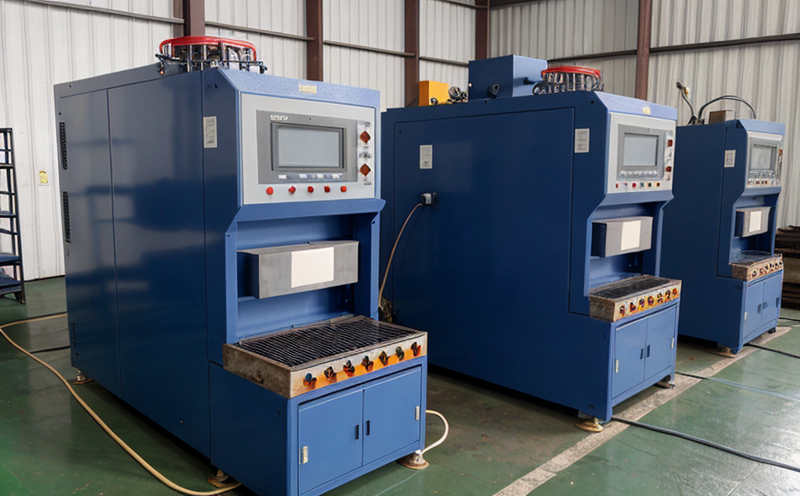IEC 60422 Mineral Insulating Oil Properties Testing
The IEC (International Electrotechnical Commission) standard IEC 60422-1 provides a comprehensive framework for the testing and evaluation of mineral insulating oils used in electrical equipment. This standard is crucial for ensuring that mineral insulating oils meet stringent performance criteria, which are essential for reliable operation of transformers, switchgear, circuit breakers, and other high-voltage electrical apparatus.
The primary focus of this testing is to evaluate the physicochemical properties that ensure the oil's suitability in preventing arcing, corona discharge, and minimizing thermal degradation. The standard covers a wide range of tests, including viscosity at various temperatures, flash point, pour point, interfacial tension with different insulating materials, dielectric strength, and oxidation stability.
Viscosity is critical for ensuring that the oil can effectively transfer heat away from electrical components during operation. Flash point measures the temperature at which vapors of the oil ignite, a key factor in fire safety. Pour point indicates how low temperatures the oil remains fluid, preventing solidification in cold environments. Interfacial tension determines compatibility with different insulating materials such as paper and cellulose.
Dielectric strength is vital for assessing the insulation capability against electrical breakdown, while oxidation stability ensures that the oil can withstand prolonged exposure to air without degrading significantly. These properties are interdependent; a change in one property may impact others, requiring a holistic approach during testing.
Given these parameters, IEC 60422-1 specifies detailed procedures for sample preparation and test execution, ensuring reproducibility across laboratories worldwide. For instance, the viscosity tests require precise calibration of viscometers at specified temperatures to avoid measurement errors. Similarly, flash point determinations are conducted in an inert atmosphere under controlled conditions.
The standard's scope extends beyond mere compliance; it also addresses quality control and assurance for manufacturers and suppliers. By adhering to IEC 60422-1, entities can demonstrate their commitment to producing high-quality mineral insulating oils that meet international standards. This is particularly important in industries where electrical equipment must operate reliably under harsh conditions.
Proper testing not only enhances operational safety but also extends the lifespan of electrical equipment by minimizing wear and tear due to thermal stress. Moreover, compliance with this standard can facilitate easier export and import processes across different countries that recognize IEC standards.
| Application | Testing Requirements |
|---|---|
| Transformer Oil | Viscosity, flash point, pour point, dielectric strength, interfacial tension. |
| Switchgear Insulating Oil | Flash point, pour point, viscosity at low temperatures, dielectric strength. |
| Circuit Breaker Oil | Viscosity, interfacial tension with arc contacts, dielectric strength. |
Understanding and implementing IEC 60422-1 is essential for quality managers, compliance officers, R&D engineers, and procurement teams within industrial manufacturing and processing sectors. It ensures that mineral insulating oils are fit for their intended applications, thereby enhancing overall product reliability and safety.
Benefits
Adhering to IEC 60422-1 offers numerous benefits to industrial manufacturers and processors:
- Enhanced Product Quality: Ensures that mineral insulating oils meet the highest quality standards, enhancing product reliability.
- Improved Safety: Reduces risks associated with electrical equipment failures due to poor oil performance.
- Prolonged Equipment Lifespan: By preventing thermal degradation and ensuring compatibility with insulation materials, the oils can extend the life of electrical apparatus.
- Regulatory Compliance: Facilitates compliance with international standards, simplifying export and import processes.
- Cost Efficiency: Minimizes downtime and maintenance costs by reducing the need for frequent replacements due to poor oil performance.
In summary, IEC 60422-1 testing is not just a compliance requirement but a strategic investment in product quality and safety. It helps industrial manufacturers and processors maintain their competitive edge in a global market.
Industry Applications
The application of mineral insulating oils compliant with IEC 60422-1 spans various sectors within the industrial manufacturing and processing industry:
- Power Generation: Transformers, switchgear, and circuit breakers used in power plants.
- Transmission & Distribution: High-voltage equipment installed on transmission lines and substations.
- Manufacturing Facilities: Electrical machinery employed in manufacturing processes that require reliable operation under varying conditions.
- Tower & Infrastructure Maintenance: Equipment used for maintenance of power towers and infrastructure where reliability is paramount.
In each application, the physicochemical properties of mineral insulating oils are critical to ensuring efficient and safe operations. By adhering to IEC standards, manufacturers can ensure that their products meet these stringent requirements.
International Acceptance and Recognition
- USA: Recognized by the National Fire Protection Association (NFPA) as a standard for transformer oil quality.
- Europe: Widely accepted in countries adhering to IEC standards, including Germany, France, and Italy.
- Asia-Pacific: Adopted by major industrial powers such as China, Japan, and South Korea for electrical equipment manufacturing.
- Australia-New Zealand: Recognized in compliance frameworks for imported electrical goods.
The global acceptance of IEC standards ensures that manufacturers who adhere to these guidelines can market their products internationally with confidence. The widespread recognition also fosters collaboration and innovation across borders, as industries align on common quality benchmarks.





